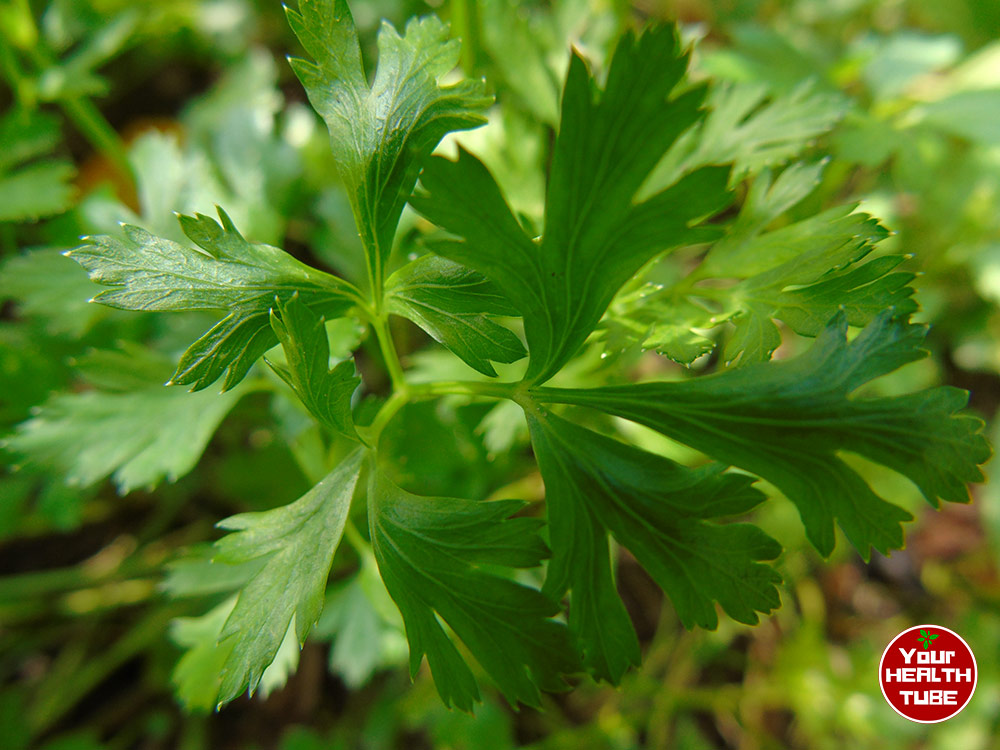Parsley (or garden parsley) is a common herb native to the Mediterranean region of southern Italy, Tunisia, and Algeria. This herb has been cultivated for more than 2000 years. It was especially appreciated in the Greek culture as it was used in different ceremonies. The Romans used it in various ways, as well. There are many fables and myths associated with the growth and origin of the parsley leaf in many European and Mediterranean cultures.
This herb is often an afterthought – a seasoning used to improve the presentation or flavor of an already existing meal. Using spices and herbs like parsley in preparing meals is a perfect way to enhance flavor and look of a meal without adding sodium, and a way to provide health benefits and additional nutrients at the same time.
Health Benefits of Parsley
The parsley leaf health benefits are really amazing. Here are some of the greatest health benefits of parsley:
- Improves Immune System
This aromatic herb is rich in many essential vitamins, including Vitamin A, Vitamin B12, Vitamin C, and Vitamin K 1 . That way it tones your bones, supports the nervous system, and keeps your immune system strong.
- Prevents Cancer
Myricetin, a powerful flavonol found in parsley leaves and other plants, has been proven to have chemopreventive properties on skin cancer 2 . Along with blackcurrants, cranberries, sweet potatoes and some other foods that contain a very high concentration of myricetin, is effective at blocking the carcinogenic properties of heterocyclic amines that are produced when grilling food at high temperatures 3 .
- Controls Your Blood Pressure
This herb contains folic acid that acts as a tonic for the heart. It can support the work of your cardiovascular system and normalize your blood pressure 4 .
- Supports Kidney Function
Parsley helps flush out toxins from your body and therefore, support the function of your kidney 5 . But, this leafy herb has oxalates that can cause issues for people with gall bladder and already existing kidney problems.
- Prevents Diabetes
Parsley contains myricetin that can support the treatment and prevention of diabetes 6 . It can reduce insulin resistance and provide anti-hyperlipidemia and anti-inflammatory effects 7 .
- Reduces Hair Loss and Hair Shedding
With a regular use of parsley essential oil, you will prevent and reduce hair loss 8 . Just massage some into your scalp and you will get the wanted results just after a few months of regular usage. Check out another great natural remedy for hair loss that you can also use: http://yourhealthtube.com/aloe-vera-hair-loss-remedies/
- Improves Bone Health
These green leaves have powerful anti-inflammatory properties. Plus, low intakes of Vitamin K have been linked with a higher risk of bone fracture 9 . Proper vitamin K intake (which this herb provides in only 10 springs) can boost bone health by improving calcium absorption and decreasing urinary excretion of calcium. Include this herb into your diet and use it daily to feel relief from joint and muscle pain.
Parsley Nutrition Facts
3.5 ounce/100 g of parsley contain about 35 calories 10 . This exceptional herb provides:
- Vitamin C (221 % DV)
- Vitamin A (279% DV)
- Vitamin K (1366 % DV)
- Folates (38% DV)
- Calcium (14% DV)
- Iron (77.4% DV)
- 5053 mcg of beta-carotene
- 5562 mcg of Zeaxanthin
(Note: these values are in percentage of RDA per 100 g (RDA-Recommended daily allowance)
Quick Serving Tips
- Soups– you can add fresh parsley to various sauces and soups, before serving for added aroma and flavor.
- Salads and Juices– You can add raw parsley directly in vegetable salads, fruit salads, and fresh smoothies and juices.
- Garnish– You can garnish numerous dishes with some fresh parsley – it simply goes with everything. Pasta is one of the most popular preparations where this herb is extensively used raw.
Raw and dried parsley could both be used for adding aroma and flavor to numerous food preparations.
Parsley Side Effects
If you are consuming blood thinners like Coumadin (warfarin) it’s essential that you don’t suddenly start to eat more foods that contain vitamin K that plays a big role in blood clotting.
Conclusion:
The health benefits of parsley include preventing and treating rheumatoid arthritis, osteoporosis, and diabetes. Moreover, due to its powerful anti-inflammatory properties, this herb acts as a pain reliever. It also provides relief from many gastrointestinal problems such as stomach cramps, indigestion, nausea, and bloating, while helping to strengthen your immune system. So, include this herb in your diet and feel its benefits. It is mostly used in the Mediterranean diet, find more about the favorite diet of Italian people: LINK
This aromatic herb can be found throughout the year in many markets. It’s a cheap leaf that everybody can get a hold of. Plus, it’s also a highly nutritious plant and contains many antioxidants and essential vitamins which can greatly improve your health.

Yes parsley is in India amd commonly cultivated there. In Hindi it is called ajmod, in Kannada it is called achumooda, and in Malayalam is is called seema malli I think. Some people say that it is adjwain but that is a completely different herb that we call caraway in English. Hope that helps.
This is awesome. God is WONDERFUL. I don’t know that this pasle is performing a great healing like this. Fantastic.